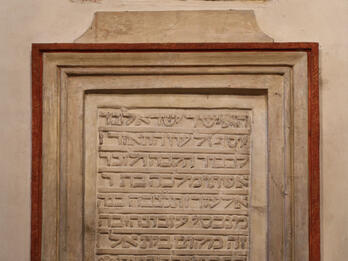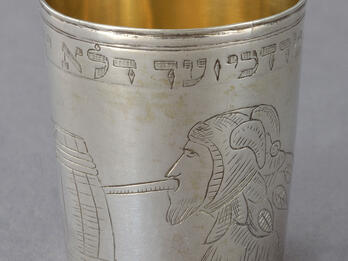Meḥir yayin (The Price of Wine): On Esther
I, Moses, son of his honor my father and teacher, the leader and guide, Israel, may he live a long and good life, I who am called Moses Isserles of Kraków, was among the exiles [see Ezekiel 1:1] who were exiled from our city in the year (5)316 [1556] because of miasma in the air, may we be spared. We were living in a land not our own [see Genesis 15:13] in the city of Shidlov [Szydłów, Poland], a place without dates or vines, with barely any water to drink, except by contrivances; a city where one eats bread with scarceness [see Deuteronomy 8:9], and there is no tree to provide shade. We were unable to observe the days of Purim with feasting and joy, to remove our woe and sighing. I therefore said, I shall arise and find joy in my actions, and my wisdom stood me in good stead [see Ecclesiastes 2:9], for the commandments of the Lord are righteous and gladden the heart (Psalms 19:9).
I placed honey and milk under my tongue [see Song of Songs 4:11], and applied my heart to seek and to search out [see Ecclesiastes 1:13] the meaning of the Book of Esther, the moral of its content, and the meaning of each and every word. And I analyzed it as best I could, for it is a pleasant story, while its hidden message is from the Tree of Knowledge. And I found a way to the dwelling of light [see Job 38:19], around which all the words of the Book of Esther revolve. For it alludes to the sum total of a person’s life until the day of his death, the people who love him and his peers; neither has the eye seen, besides You, God, what will be wrought for one who waits for Him (Isaiah 64:3). I then placed the text in a book of my writings, to be preserved for my old age. [ . . . ]
And [the text] says: This is Ahasuerus who reigned, etc. (Esther 1:1). In other words, this is the well-known man. The sages expounded [b. Megillah 11a] that who reigned signifies that he reigned on his own, that is, he was not of royal descent. They thereby revealed a profound idea: for in truth a person can rule on his own, and the choice depends on him, whether he will be like one of the angels upon high, even if he is not “of royal descent” in this regard. This is as the sages interpreted in chapter nine [of b. Shabbat, 88b] when the angels said: what is one born of woman doing among us? Furthermore, since he can rule on his own and by his choice over all the things found in the world, or alternatively to be enslaved to them, as the sages expounded [see Genesis Rabbah, 8:12], and let them have dominion over the fish of the sea, etc. (Genesis 1:26), that if they merit it, they will have dominion; if they do not merit it, others will have dominion over them.
Thus, the sages interpreted in the first chapter of b. Megillah [11a]: who reigned—Rav said: “he reigned on his own.” Some say this in praise, while others say it in condemnation. Some say it in praise, that there was no man in the kingdom more fit for the throne than he. And others say it in condemnation: “he was not fit to be a king, but he paid a lot of money.” By this they meant to say that the choice one has sometimes leads to praise and sometimes to condemnation. For when he inclines toward the good it is praiseworthy for a person, and then he is greater than the ministering angels, and that is the meaning of “there was no man in the kingdom more fit for the throne than he.” By contrast, if he inclines toward the bad, he is to be condemned. The metaphor is that “he paid a lot of money,” meaning that his main intention and goal was to amass wealth.
It next says that he reigned from Hodu [India] to Cush [Ethiopia] (Esther 1:1), which means from the beginning of his birth, which is when glory [hod] and splendor are before him, for everyone desires him. This is as the sages interpreted in the midrash on Ecclesiastes [Ecclesiastes Rabbah, 3:16], on the verse: also He has set the world in their heart (Ecclesiastes 3:11), that He put the love of the world in their heart: if a man has ten sons, and the youngest is full of spittle, he still loves him more than all the rest. To Cush: this is the day of death, which darkens people’s faces, and this is the absence of life that is twisted around the heel of every living thing. The sages called it darkness, as the teacher [Maimonides, Guide of the Perplexed III.10] explained with regard to the verse: who produces light and creates darkness (Isaiah 45:7). And therefore he called it Cush, who was stricken in his skin and his countenance is the darkest of men.
And apparently this was their intention when they said regarding the verse: And Miriam and Aaron spoke against Moses because of the Ethiopian woman whom he had taken (Numbers 12:1), that this meant it was taken away from him, as if the Ethiopian woman were dead or missing. See how wonderful is their saying in the first chapter of b. Megillah [11a]: “Rav and Samuel disputed this verse. One said Hodu and Cush are situated from the end of the earth to the other end, and the other one said one of them is next to the other.” The question arises: why did they say “from the end of the earth to the other end,” and they did not say “one at the beginning of the earth and the other at the end”? For if it has no beginning, then it has no end, as scholars agree that anything that has no first stage has no last stage, and likewise if it has no beginning it has no end. They could equally have stated, “from the beginning of the world to its other beginning.”
Rather, it seems that they meant to allude to what we are saying, and one master said it in one manner and the other formulated the idea in a different fashion, and they do not disagree. For it is known that man is called a microcosm, as the teacher [Maimonides, Guide of the Perplexed I.72] explained at length. Therefore, it is stated that Hodu and Cush are situated “from one end of the world to the other end,” because one is at the beginning of a person’s days and the other is at the end, and they are all his days in the world. To hint to this secret, they said “from one end of the world to the other end,” and they did not say “from the beginning of the world,” because a person’s birth is also the end of one world—i.e., the days of pregnancy—which is also called a “world,” as noted by the sages, of blessed memory. In connection to what did David [in Psalms] mention these five phrases of “bless, my soul”? They correspond to the five worlds he dwelled in: he dwelled in his mother’s womb and recited a song, etc. (b. Berakhot 10a). The second sage, who said that Hodu and Cush are next to each other, meant that our days on the earth are like a shadow, and if one lives a thousand years, it is as if he had never been, and in that respect they are close to one another. In the same vein they also interpreted the verse which states that [Solomon] ruled the whole region on this side of the river from Tifsaḥ to Gaza (1 Kings 5:4). Rav and Samuel: One said, “Tifsaḥ is at the end of the world and Gaza is at the end of the world” and the other one said, “Tifsaḥ and Gaza are next to each other.” These statements should be interpreted in the same manner. However, in the case of Solomon, who was a sage of Israel and one of its prophets, God made his reign greater than that of Ahasuerus. For Tifsaḥ is a word whose letters are reversed,1 like keves and kesev [both meaning a sheep], as the master explains in Guide [of the Perplexed II.43], that it is the way of prophets and sages to speak in this manner. He proceeded to explain that the word boḥalim [they abhor] is like ḥovlim [they damage], and similarly Tifsaḥ is similar to tispaḥ (join), which is from the expression please, let me join [safḥeni] (1 Samuel 2:36). This hints at the day the fetus is conceived in its mother’s womb, when it starts to form and join its limbs together, as it is said: Before I formed you in the belly I knew you, etc. (Jeremiah 1:5). And the phrase to Gaza refers to the world-to-come, which is all power [‘oz] and glory before Him. Therefore, it states that he ruled from Tifsaḥ to Gaza, the whole region on this side of the river, that is, the rivers that flowed from the Garden of Eden [see Genesis 2:10–14]. This applies solely to the kings of Israel, but regarding the kings of the nations of the world, who are idol worshipers, it states that he reigned only from Hodu and Cush, which is the day of death and no more, because they have no portion in the world to come.
Notes
[I.e., metathesis, the transposition of sounds or letters in a word.—Trans.]
Credits
Moses Isserles, “Meḥir yayin (The Price of Wine): on Megillat Esther (Hebrew)” (Manuscript, Kraków, ca. 1556). Published in: Moses ben Israel Isserles, Meḥir Yayin : ʻal Megilat Ester, ed. Elimelekh Elʻazar Frankel (Bnei Brak: Frankel, 1999), pp. 3, 8.
Published in: The Posen Library of Jewish Culture and Civilization, vol. 5.




